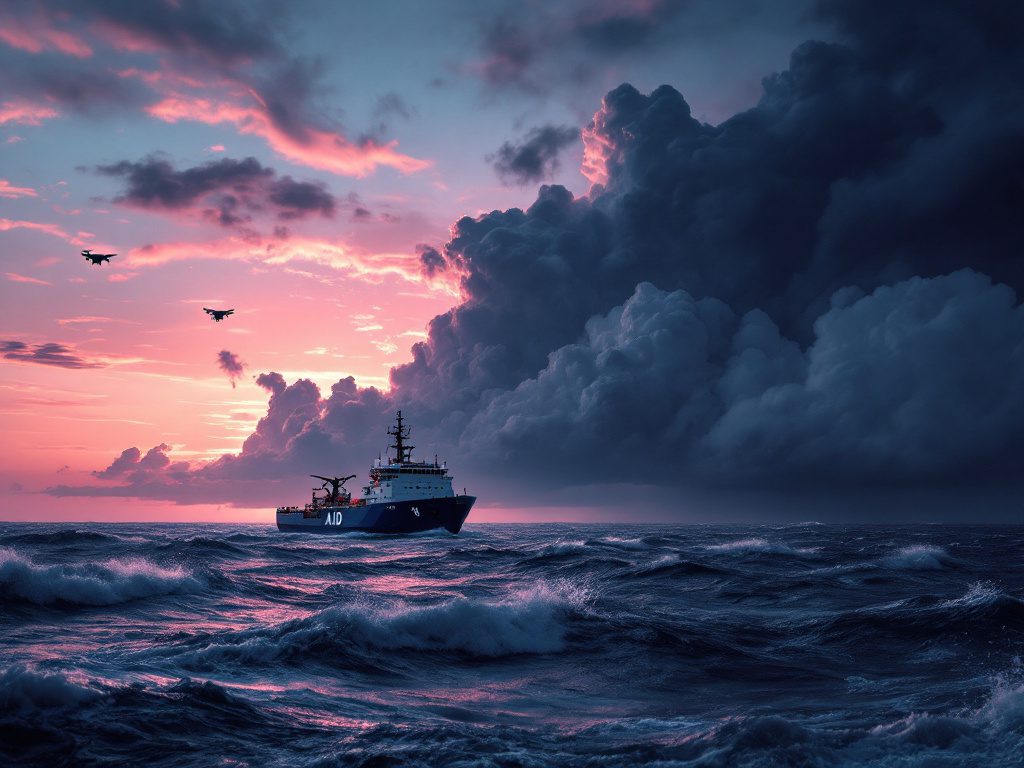The Perilous Voyage for Humanitarian Aid
It was just after midnight off the coast of Malta, far from the world’s headlines and even farther from Gaza’s shell-pocked shores, when the crew of the aid vessel Conscience received a brutal reminder that there’s no “safe zone” for those challenging Israel’s suffocating blockade of Gaza. The ship, operated by the international Freedom Flotilla Coalition (FFC), had slipped away under a shroud of secrecy, carrying volunteers from over 21 countries and a desperately needed cargo of medical supplies and relief tents destined for civilians stranded by war. By dawn’s light, the vessel was scarred by a drone strike—its hull breached, power lost, and hope teetering on the waves.
This attack, occurring a mere 17 nautical miles east of Malta, forced the crew to issue a frantic SOS. Disturbingly, the response from Maltese authorities was slow, drawing intense criticism from global human rights observers. Instead, Cypriot rescuers were first on the scene, racing to prevent a humanitarian catastrophe at sea. According to the FFC, the targeting of the ship’s generator—a move that left it dead in the water—was seen as “deliberate sabotage” meant to amplify risk and suffering for those on board.
Who would seek to silence such a mission of mercy? While the FFC stopped short of naming the perpetrator, Arabic-language media and regional observers pointed to Israel, a charge consistent with previous Israeli efforts to thwart flotillas to Gaza. The silence from accountable parties is deafening, but the intent behind the attack is unmistakable.
Laws Flouted, Humanitarian Principles Betrayed
Under maritime conventions, the responsibility to assist vessels in distress is clear and binding. Yet Maltese authorities failed to provide the immediate aid required under international law, a dereliction that casts a disturbing shadow over Europe’s supposed commitment to upholding humanitarian norms. The area of the attack falls within Malta’s official Search and Rescue region, making its sluggish response more than a bureaucratic lapse—it’s a violation with potentially deadly consequences.
Legal scholars are quick to point out the international implications. As Harvard Law’s John Cerone notes, “Both the attack on a civilian aid vessel in international waters and the failure to respond to distress fall foul of legal obligations under the law of the sea.” These lapses aren’t just procedural; they erode the fragile foundations of international humanitarian order.
The question gnawing at many: How did it come to this point, where fundamental neutral principles—humanitarian access, maritime rescue—are so easily abandoned? Conscience’s ordeal isn’t without precedent. The world recalls the deadly 2010 Gaza flotilla, when Israeli commandos raided a Turkish vessel in international waters, leaving nine activists dead. Global condemnation followed, but the underlying dynamics of blockade, militarized response, and international law overlooked persist.
Beyond that, the blockade’s human toll cannot be ignored. According to a recent United Nations report, over two million Gazans are trapped in what amounts to an open-air prison—life expectancy plummeting, medical supplies threadbare, children shuttling through trauma with little hope of reprieve. Charities and activists have continued to risk their lives to pierce this wall of isolation, only to meet violence, indifference, or, as now, remote-controlled destruction. Why, you might ask, is it more dangerous to deliver bandages and tents than to drop bombs?
“This isn’t a story about maritime law or military hardware alone. It’s about whether the world still believes in the sanctity of humanitarian relief—about a test of the shared values that underpin any just society.”
An Unwavering Commitment to Justice—Or Just More Silence?
The activists on board Conscience are not alone in their conviction. Across continents, a groundswell of ordinary citizens, NGOs, and even some government officials have demanded that Malta, the EU, and the so-called international community do more than issue tepid statements of concern. They argue that maintaining the status quo is not a neutral act—it is a tacit endorsement of violence against those working for peace and relief.
History is clear on the dangers of selective outrage and apathy in the face of humanitarian crisis. Consider the global protests that followed the attack on the 2010 flotilla, or the way indifference during past famines and sieges led only to deeper suffering and moral reckoning. A closer look reveals that when international actors shirk their responsibilities, it’s civilians—families, children, the wounded and sick—who pay in lost lives and lost futures. As Dr. Hanan Ashrawi, a prominent Palestinian leader, recently observed: “Aid should never be criminalized. Those who seek to help cannot become targets of war.”
Expert voices across the humanitarian landscape echo this urgency. Sally Abi-Khalil, Middle East Director at Oxfam, points out that attacks on relief efforts create ‘an unprecedented climate of fear for NGOs and civilians alike’ and actively undermine chances for a peaceful outcome. She warns that repeated violations will only “deepen the cycle of distrust and hostility, making eventual reconciliation near impossible.”
Tension between the drive for safety and the call for justice is not new. Yet there is a choice: Will Europe and the broader West rise in defense of those who risk all for the sake of suffering strangers? Or will political expediency continue to trump the basic tenets of humanitarian law and moral responsibility?
Progressive values require more than empathy—they demand courageous action in the face of injustice, clear-eyed solidarity with the besieged, and a willingness to call out not just the perpetrators of violence, but also those who enable it through inaction. As the world watches the fate of Gaza’s civilians and the humanitarians who try to aid them, the contours of our shared humanity are being redrawn in real time.

